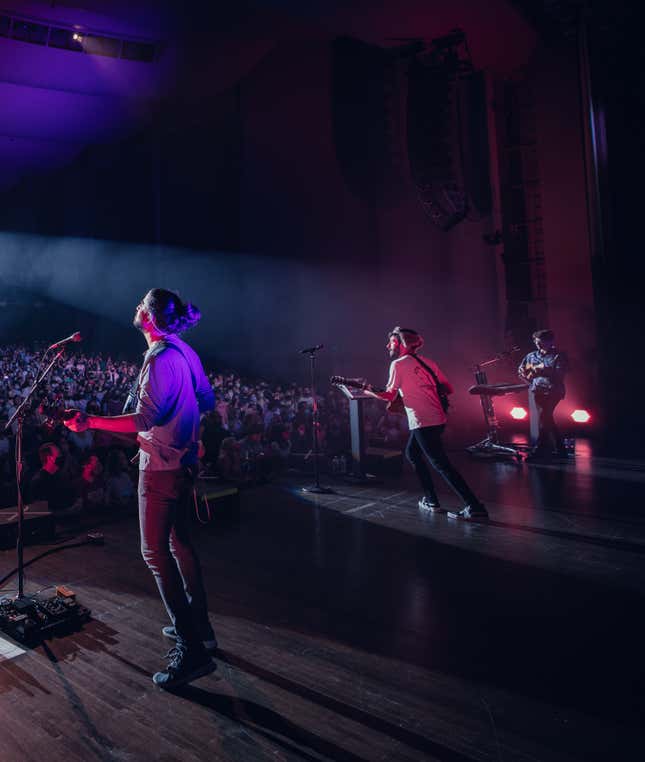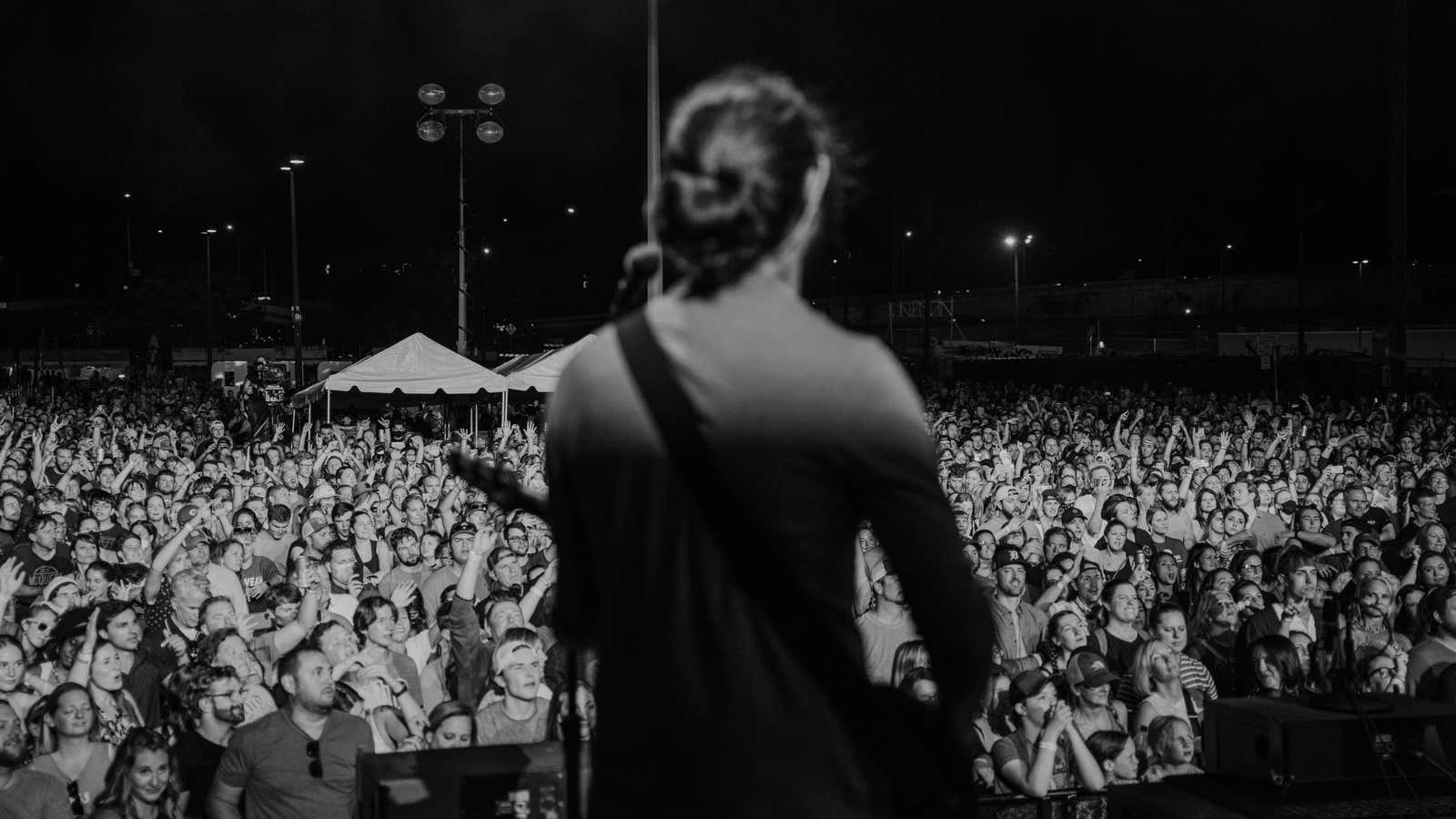As carbon-emitting activities go, performing or attending a concert hardly compares with burning fossil fuels or raising large herds of livestock. But more musicians are starting to acknowledge the environmental impact of their touring. The travel, the concessions, the energy used at the venues—it all adds up, and it’s unclear that carbon offsets or climate-change education efforts aimed at a captive audience of fans can balance out the cost to the planet.
“There are basically two different opinions,” says Adam Met, the bassist in indie pop band AJR and the founder of a nonprofit focused on sustainability measures. “There are artists such as Coldplay, who have said they’re not going to go on tour at all until it’s something that can be done sustainably. And then there are artists like us and The Lumineers and people like Shawn Mendes and Billie Eilish, who are going to continue to go on tour but use it as a way to educate their fans, in addition to taking actions themselves.”
As AJR prepared for its first tour dates since the Covid-19 pandemic began, Met took a break from rehearsals and from his dissertation—he’s working on a PhD in sustainability and human rights from the University of Birmingham in the UK—and spoke with Quartz about how he and his bandmates, brothers Jack and Ryan, are reducing the climate impact of their concerts; why carbon offsets are problematic; and what he wishes he could change about the sustainability movement. The interview transcript below was lightly edited for length and clarity.
Quartz: It feels like sustainability ought to be everybody’s passion project, but some people are obviously more committed to it than others. How did you get interested in the cause?
Adam Met: My first semester [at Columbia University], one of the courses I took was called Challenges in Sustainable Development, and it was taught by a guy named Jeff Sachs, who was an Obama adviser, and he helped to craft and write the UN Millennium Development Goals and the Sustainable Development Goals. That was really my first foray into sustainable development. But before that, I was inspired by one of my high school teachers. In my high school, there was a human rights course offered, which is pretty unusual. In taking that course, I started to learn about the connections between human rights and environmentalism and sustainability and climate change. So that kind of put the bug in my head, and then taking that course with Jeff Sachs inspired me to take more and more courses as an undergrad.
AJR’s music isn’t especially political, but you’ve found ways to use the influence you have as musicians to inspire activism.
Yeah, there are a couple of songs where we’ve attempted to be somewhat activist. Our song “Burn the House Down” was picked up by the March for Our Lives movement, which was amazing for us because it wasn’t written about that. But the students from Marjory Stoneman Douglas High School in Florida picked up the song and used it as their theme song for that summer as they were touring. So we engaged March for Our Lives on our tours and they’d come and set up in our lobbies and register people to vote.
And then we have songs like “Birthday Party,” that talk about, you know, I would love it if the world was this amazing place where we were nice to immigrants and we had a female president and all of these kinds of dreams that we want to see happen. So there are songs that have political overtones. But from a sustainability perspective, I, and we as a band, try and do as much as we can to educate our fans using this platform that we built, which is AJR.
So what kinds of sustainability measures will you be applying to your new tour?

On the tour itself, there are three main areas that we focus on in terms of us taking action. One is plastics. Backstage, we try to eliminate all single-use plastic. In some cases we use bioplastic, but in many cases we use real silverware and cups and we end up running them through the dishwasher because—in case people didn’t know—running a dishwasher uses a lot less water than actually washing dishes by hand. At the concessions, where the fans get their food and drinks, there are certain venues we’re working with to make sure that they’re not using single-use plastic either. And that includes venues in Peoria, Illinois; Park City, Kansas; Wallingford, Connecticut; Albany, New York; Madison, Wisconsin; and Portsmouth, Virginia. For those shows, we’re encouraging fans to reduce plastic by bringing a reusable water bottle and using refillable water stations at the concessions.
The second category we focus on is food waste, because at music venues and many other places, there’s a tremendous amount of food waste, which is a big problem that’s related to climate change because food takes up so much land. If we were using the appropriate amount of land and it was being farmed appropriately, then we would make a big dent in climate change. So one of the things we do is donate extra food both from the backstage area and from the main venue itself to shelters. And that’s being done [at our 2021 shows] in Jacksonville, Florida; Des Moines, Iowa; Park City, Kansas; Albany, New York; and Portland, Maine. In Des Moines specifically, the venue is composting all the food that can’t be donated.
The third focus area is energy. A few of the venues that we’re working with are getting their energy from renewable sources. And at the Atlantic Union Bank Pavilion in Portsmouth, Virginia, the waste from the venue—meaning some of the food waste, but also other waste—is converted to energy for the local shipyard.
What about at the individual level? How will you encourage fans to get involved?
The number one individual action that people can take is voting. That’s one of the reasons why we’ve engaged with March for Our Lives to register people to vote at our shows. And it’s not just voting without doing your research. You need to look up websites that can explain, for instance, the climate-related voting records of the people who are running and the actions they’ve already taken.
There are a lot of other kinds of actions that fans can take. So, for example, at our merchandise table, we’re donating a percentage of the merch sales from certain items to charity, and we’re specifically picking charities that are related to sustainability. Some of them are going to ones that specifically deal with offsets. Some of them are going to the social side of sustainability, which is something that we really care about, engaging people around education and actions they can take.
One thing The Lumineers did that was really exciting for me to see was they ended up offsetting all the travel of their fans to and from their concerts. We won’t be able to do this for our upcoming tour, but what I’m looking at for our next tour, which is in the spring of 2022, is how to incentivize fans to carpool or drive electric vehicles. Those kinds of incentives, I think, are really important. And we’re working with our promoters now to create more of those.
I read an interview where you said AJR was the first band represented by WME to ask that your agents put a carbon fee into your contracts with promoters for your shows. How does that work?
The carbon fee goes toward offsetting [emissions from] the flights, the transportation, the food, the electricity usage—everything. It ends up costing a few hundred dollars per show, which is very little for the promoter to cover. So they pay that to us now and we use different offset programs.
You’re not shy, though, about pointing out the problems with carbon offsets.
Offsets are not perfect. We’re working on finding the best ones. Planting trees is not perfect because as we all know, there have been crazy forest fires, and a lot of the forests that have burned down have been from offsets that have been planted. So it’s a problem. But I’m going all over the place to try and solve these pain points.
How were you even inspired to ask for a carbon fee? Did you know of another band that was doing it?

No. There was an instance a couple of years ago where we were playing on Good Morning America and we got stuck in Cincinnati the night before. We were supposed to fly to New York, get three hours of sleep, and then go right to Good Morning America to play. But there was a massive storm in Cincinnati, so all the flights were canceled, and we were going to miss our performance. So we ended up flying private. Years ago, I had started to do some research about the carbon effects of flying private, which is significantly worse than flying commercial, even though flying commercial is still really problematic. So immediately after flying private, we offset all of our carbon emissions from that flight. That got me thinking about how we can offset everything we’re doing instead of just, you know, the actions that are the worst.
So walk me through the process a little bit: You have this kind of wild idea. It’s not standard in your industry. You have agents that you have to go through, and promoters and venues that they have to contract with. How do you just change the standard operating procedure for that?
Well, the easiest people to convince were my brothers, and the very first thing I needed was to have them on board if we were going to take this approach. And they are very excited about supporting these initiatives because they realize it’s incredibly important—as the new IPCC report said, we are past the tipping point and we’re going to continue to see all of these devastating effects of climate change. Next I talked to our management, and convincing them was also relatively easy.
The hard first step was with the agents, because an agent doesn’t just work with us. They have dozens, if not hundreds, if not thousands of bands that they work with. And they are pretty set in their ways. So I started to engage with our agent at William Morris and kind of teach him about how easy it would be. And that’s the thing that made him start working toward it—that these steps that you can take to make these changes are so easy and simple to start. And then I think it was about a month later that we got our first contract that had the carbon fee included in it.
The first promoter that was willing to do it was at a college. And that makes sense. We play a lot of college shows. And then from there, we started to do it with private events. So we started to do it with one-off shows and now we’re exploring how to do it with our tour.
Your nonprofit, Sustainable Partners, works with a lot of corporate partners. Do you buy what they’re selling regarding sustainability?
Yes and no. There are a lot of corporations out there that are doing a lot of signaling and greenwashing. When there is no international standard for corporations around sustainability, corporations set their own goals, which, as any person would probably be able to tell when corporations are setting their own goals, they’re going to set something that’s achievable for them. So they end up looking good and they can put out press releases saying, “Hey, we achieved everything we wanted to.”
And then there are other businesses that are being incredibly ambitious. We’ve had some of their executives as guests on our podcast and we’ve had some of them come in and be speakers for our fellowship program. Some of them are using really innovative technologies to track tree planting and the effects of climate change, in addition to taking their entire business operation and making it climate-neutral. So some of them are doing a really good job. Some of them are doing not so good a job. I think I’ll leave it there and not name too many names.
[But] the net-zero approach that’s being taken nationally and internationally is not going nearly far enough, because a lot of the corporate commitments that are being made are really heavy on the offsets. And that’s how they’re getting to net zero, with very minimal [carbon reduction] from the actions they’re taking. And we need to rebalance that. It should be much more about the actions that they’re changing, and then, sure, cover the rest with offsets.
It’s still a relatively new phenomenon just to have corporations talking about sustainability. Is the fact that they’re even raising the issue perhaps helpful to the cause?
I think if they’re just talking about it, it’s actively unhelpful. If businesses are using these unregulated words like “sustainable,” they’re going to convince people to buy their product, because it is a really good PR move. But if it’s not actually making concrete change, then that’s the epitome of greenwashing.
If there was something you could change about the sustainability movement right now, what would it be?
Maybe it’s two things. One thing is a carbon tax—that would make such a difference and not only encourage but almost force businesses to make their commitments much stronger, and not as much focused on the net side of net zero. That’s number one.
Number two would be to have at least federally, if not internationally, a formal definition of sustainability. If there was a formal definition, or some sort of certification in order to use that label of “sustainable,” then for people making choices between products or the way they’re engaging with the world, if they knew that saying something was sustainable actually had some weight behind it, I think that would go a long way.
You’re obviously aware of the power of your platform. Do you think other people in the entertainment field use their platforms to full effect?
I think a lot more work can be done amplifying voices of young advocates and people of color in indigenous communities, for example. Giving these voices greater reach to talk about sustainability is an amazing tool, and something that celebrities and musicians can really do.
But it’s also a struggle because fans follow an artist for a specific reason, and normally it’s the music or the shows. And so there has to be a balance—you can’t change all of your social accounts just to be focused on environmentalism or human rights or sustainability, because you need to give fans what they’re there for. Although look at somebody like Leo DiCaprio, who has given his social media over completely to sustainability. He doesn’t post anything at all about himself or the movies or the other work he’s doing. It’s only about sustainability.
Personally, on my social media accounts, I try to keep it one-third related to music, one-third about me personally, and then one-third related to these other passions I have in my academic work. And that has seemed to be a good balance. If [posting about sustainability] wasn’t something that I saw that fans also really wanted to engage with, I would still do it. But it’s really nice to see that our fans are engaging with us on it so strongly.
